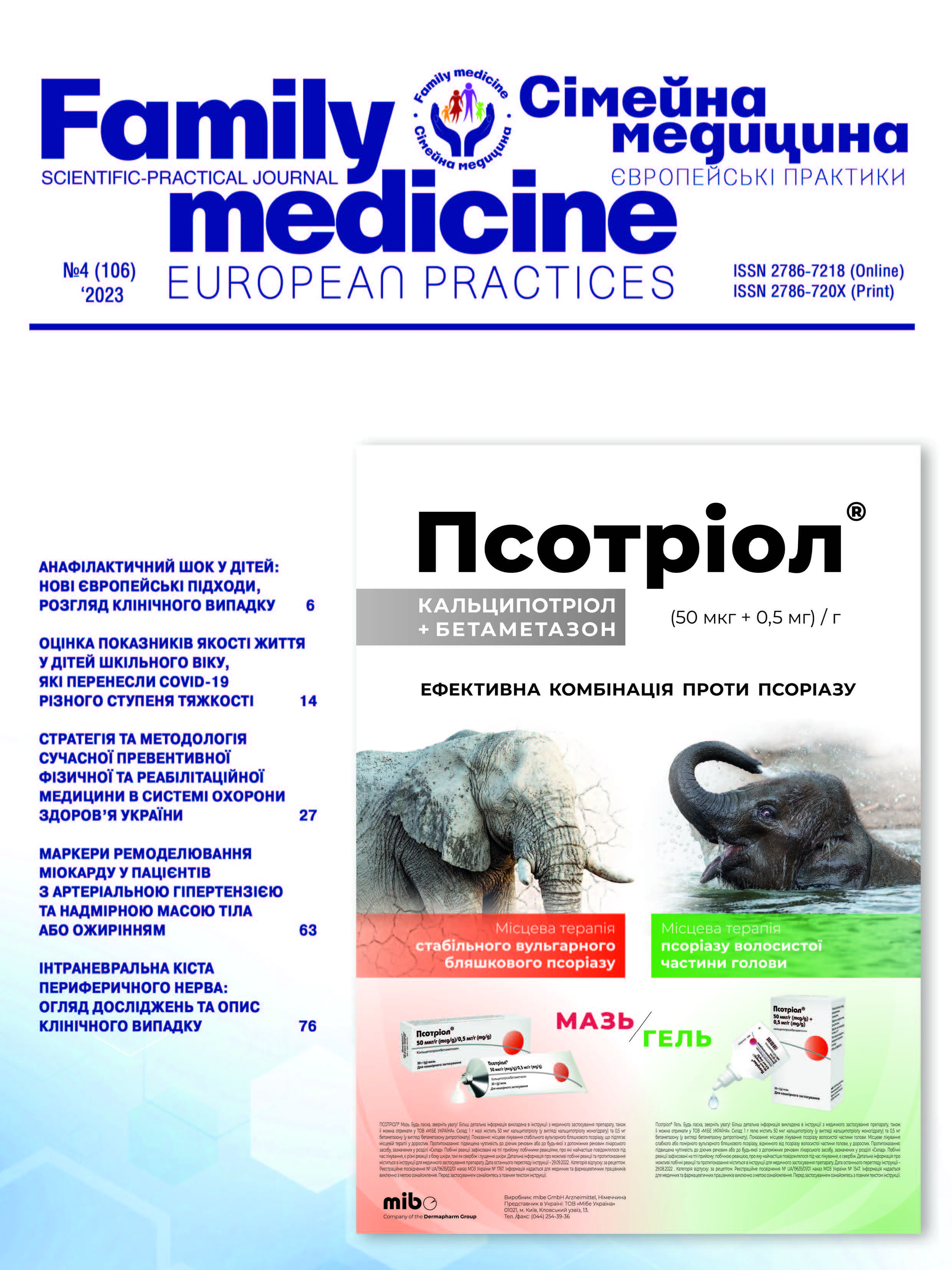Медсестринська оцінка стану здоров’я при догляді за людьми похилого віку
##plugins.themes.bootstrap3.article.main##
Анотація
У статті наведено особливості організації сестринської допомоги особам похилого віку. Наріжним каменем геронтологічного сестринського догляду є комплексне оцінювання стану здоров’я пацієнтів. Відомо, що потреби людей похилого віку в медичному обслуговуванні складні, зумовлені поєднанням вікових змін, хронічних захворювань, спадковості та способу життя.
Під час оцінювання та надання допомоги особам похилого віку до команди охорони здоров’я входять лікарі різних галузей, медичні сестри, соціальні працівники, духівники, провізори, реабілітологи тощо. Кожен член команди робить свій внесок, і медсестра часто може опиратись на знання інших для покращання процесу оцінювання. Вона повинна своєчасно та турботливо забезпечувати сестринську допомогу.
Медичні сестри надають послуги з догляду за людьми похилого віку, тому їм життєво важливо помітити будь-які ознаки зміни психічного та загального стану на основі базового рівня пацієнта. Адже фізичне та соціальне середовище може підтримувати або пригнічувати здібності літньої людини.
Вдосконалення навички комплексної геріатричної оцінки у медсестер є основою ефективного ведення людей похилого віку. Складання і виконання раціонального індивідуального плану догляду за пацієнтом можуть покращити результати підтримки здоров’я, підвищити впевненість медсестринського персоналу. Важливими компонентами комплексної геріатричної оцінки є функціональна і фізична оцінки стану основних органів і систем людини (серцево-судинної, дихальної, нервової, органів чуття, шкіри, сечостатевої та інших).
Комплексна оцінка складається з об’єктивних і суб’єктивних елементів, і те, як інтерпретуються дані оцінки, має велике значення.
##plugins.themes.bootstrap3.article.details##

Ця робота ліцензується відповідно до Creative Commons Attribution 4.0 International License.
Автори зберігають авторське право, а також надають журналу право першого опублікування оригінальних наукових статей на умовах ліцензії Creative Commons Attribution 4.0 International License, що дозволяє іншим розповсюджувати роботу з визнанням авторства твору та першої публікації в цьому журналі.
Посилання
Charlotte Eliopoulos. Gerontological Nursing. LWW; 10, North American edition. 2021; 576 p.
Patricia A. Williams. Basic Geriatric Nursing, 8th edition. Mosby; 2022. 416 p.
Meiner SE, Yeager JJ. Gerontologic; 6th edition. Mosby; 2018. 672 p.
Mauk KL. Gerontological Nursing: Competencies for Care; 4th edition. Jones & Bartlett Learning; 2017. 1010 p.
Aldeen AZ, Courtney DM, Lindquist LA, Dresden SM, Gravenor SJ. Geriatric emergency department innovations: preliminary data for the geriatric nurse liaison model. J Am Geriatr Soc. 2014;62(9):1781–5. doi: 10.1111/jgs.12979.
Odette N. Gould, Suzanne Dupuis-Blanchard, Anna MacLennan. Canadian Nursing Students and the Care of Older Patients: How Is Geriatric Nursing Perceived? Journal of Applied Gerontology. 2015; 34 (6): 797–814. https://doi.org/10.1177/0733464813500585
Jennings LA, Laffan AM, Schlissel AC, Colligan E, Tan Z, Wenger NS, et al. Health Care Utilization and Cost Outcomes of a Comprehensive Dementia Care Program for Medicare Beneficiaries. JAMA Intern Med. 2019;179(2):161–6. doi: 10.1001/jamainternmed.2018.5579.
Sun W, Grabkowski M, Ashtarieh B. The Development of a Deprescribing Competency Framework in Geriatric Nursing Education. West J Nurs Res. 2021;43(11):1043–50. doi: 10.1177/01939459211023805.
Lindhardt CL, Beck SH, Ryg J. Nursing care for older patients with pressure ulcers: A qualitative study. Nurs Open. 2020;7(4):1020–5. doi: 10.1002/nop2.474.
Hemmy LS, Linskens EJ, Silverman PC, Miller MA, Talley KMC, Taylor BC, et al. Brief Cognitive Tests for Distinguishing Clinical Alzheimer-Type Dementia From Mild Cognitive Impairment or Normal Cognition in Older Adults With Suspected Cognitive Impairment. Ann Intern Med. 2020;172(10):678-87. doi: 10.7326/M19-3889.
Tinetti ME, Naik AD, Dindo L, Costello DM, Esterson J, Geda M, et al. Association of Patient Priorities-Aligned Decision-Making With Patient Outcomes and Ambulatory Health Care Burden Among Older Adults With Multiple Chronic Conditions: A Nonrandomized Clinical Trial. JAMA Intern Med. 2019;179(12):1688–97. doi: 10.1001/jamainternmed.2019.4235.
Haske-Palomino M, Carlson R, Gatley L. Elder veteran program: A description of a nurse practitioner-led inpatient geriatric consult model. J Am Assoc Nurse Pract. 2023;35(4):229–34. doi: 10.1097/JXX.0000000000000844.
Briggs R, McDonough A, Ellis G, Bennett K, O’Neill D, Robinson D. Comprehensive Geriatric Assessment for community-dwelling, high-risk, frail, older people. Cochrane Database Syst Rev. 2022; 5(5):CD012705. doi: 10.1002/14651858.CD012705.pub2.
Yao NA, Ritchie C, Cornwell T, Leff B. Use of Home-Based Medical Care and Disparities. J Am Geriatr Soc. 2018;66(9):1716–10. doi: 10.1111/jgs.15444.
Blanquicett C, Cohen JB, Flowers C, Johnson T 2nd. The Role of the Comprehensive Geriatric Assessment in the Evaluation of the Older Cancer Patient [Internet]. Oncology (Williston Park). 2019;(33). Available from: https://nursekey.com/gerontologic-assessment/.
MedlinePlus [Internet]. Aging changes in body shape. Bethesda (MD): National Library of Medicine (US). Available from: https://medlineplus.gov/ency/article/003998.htm.
MedlinePlus [Internet]. Aging changes in skin. Bethesda (MD): National Library of Medicine (US). Available from: https://medlineplus.gov/ency/article/004014.htm.
MedlinePlus [Internet]. Aging changes in the heart and blood vessels. Bethesda (MD): National Library of Medicine (US). Available from: https://medlineplus.gov/ency/article/004006.htm.
MedlinePlus [Internet]. Aging changes in the senses. Bethesda (MD): National Library of Medicine (US); 2022. Available from: https://medlineplus.gov/ency/article/004013.htm.
Hackman P, Hult M, Häggman-Laitila A. Unfinished nursing care in nursing homes. Geriatric Nursing. 2023;51:33–9. doi: 10.1016/j.gerinurse.2023.02.010.
Dys S, Tunalilar O, Hasworth S, Winfree J, White DL. Person-centered care practices in nursing homes: Staff perceptions and the organizational environment. Geriatr Nurs. 2022;43:188–96. doi: 10.1016/j.gerinurse.2021.11.018.
Musich S, Wang SS, Schaeffer JA, Kraemer S, Wicker E, Yeh CS. The association of physical activity with loneliness, social isolation, and selected psychological protective factors among older adults. Geriatr Nurs. 2022;47:87–94. doi: 10.1016/j.gerinurse.2022.07.006.
Tkatch R, Musich S, MacLeod S, Kraemer S, Hawkins K, Wicker ER, et al. A qualitative study to examine older adults’ perceptions of health: Keys to aging successfully. Geriatr Nurs. 2017;38(6):485–90. doi: 10.1016/j.gerinurse.2017.02.009.
Puri S. Epidemiology of Polypharmacy in Geriatric Patients. J Gerontol Geriat Res. 2021;10:11. doi: 10.35248/2167-7182.21.10.582.
Potard C, Landais C. Relationships between frustration intolerance beliefs, cognitive emotion regulation strategies and burnout among geriatric nurses and care assistants. Geriatr Nurs. 2021;42(3):700–07. doi: 10.1016/j.gerinurse.2021.02.018.
Pamela Z. Cacchione. Innovative care models across settings: Providing nursing care to older adults. Geriatric Nurs. 2020;41(1):16–20. doi: 10.1016/j.gerinurse.2020.01.011.
Gilmartin MJ. Thinking like a geriatric nurse: Integrating the 4Ms and the SPICES model to support age-friendly nursing care for older adults. Geriatric Nurs. 2020;41(5):662–4. doi: 10.1016/j.gerinurse.2020.08.014.
Sum G, Nicholas SO, Nai ZL, Ding YY, Tan WS. Health outcomes and implementation barriers and facilitators of comprehensive geriatric assessment in community settings: a systematic integrative review [PROSPERO registration no.: CRD42021229953]. BMC Geriatr. 2022;22(1):379. doi: 10.1186/s12877-022-03024-4.





